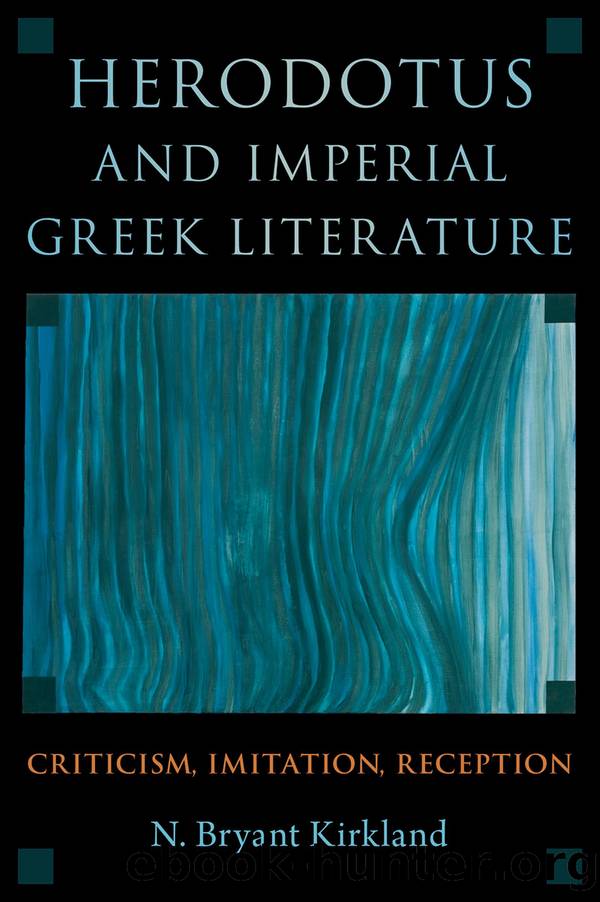Herodotus and Imperial Greek Literature by N. Bryant Kirkland

Author:N. Bryant Kirkland
Language: eng
Format: epub
Publisher: Oxford University Press
Published: 2022-01-15T00:00:00+00:00
5
Removable Eyes
Lucian and the Truths of Herodotus
Across Herodotusâs Histories, nothing seems certain except uncertainty and change.1 A quality of instability applies not only to the fortunes of the workâs many actors but also to the readerâs experience in negotiating chronological jumps, shifts in topic, and apparent digressions. Herodotusâs sprawling text has a formal variety that recapitulates thematic focus: instability inheres in both the workâs documentation of the âcircle of human affairsâ (1.207.2) and the readerâs effort to reduce diffuseness to one clear pattern, amid analepses, prolepses, and diverting logoi that can make reading itself feel destabilizing. And if instability in Herodotus has narratological dimensions that mirror its content, it is also the case that Herodotusâs thematic focus on instability encompasses more than just the rise and fall of various places. As scholars have shown, the Histories has the capacity to unseat an easy sense of fixed identity, too.2 The workâs ethnographic features may lure readers into a sense of patterned fixityââGreeks behave this way, Persians that way,â and so onâbut such would-be patterns inevitably belie the complexity of Herodotusâs world.3
Relatively early on in the work, for instance, Herodotus gives readers cause to doubt ethnographic essentialism when he describes how the Lydians, seemingly overnight, undertook a complete change in lifestyle (Ïὴν ÏᾶÏαν δίαιÏαν Ïá¿Ï ζÏÎ·Ï Î¼ÎµÏÎβαλον) by adopting new clothes, surrendering weapons, teaching their sons to be salesmen, and taking up the cithara and harp (1.157.2). Typical markers of ethnographic enumerationâclothes, customs, familial relationsâfactor here as evidence of willed change, not unbroken tradition. As W. R. Connor has written, âBeing Ionian (or Dorian, or Aeolian) . . . was a decision, conscious or unconscious, not an automatic inheritance from oneâs ancestors.â4 Other instances of altered names, newly adopted allegiances, and deviations from expected custom only amplify this sense that change in Herodotus is not restricted to shifts up and down in fortune but can, in fact, embrace fundamental reconfigurations of identity. Compare Herodotusâs expressions of uncertainty in discussing the Caunians:
The Caunians I myself believe to be natives of the land, but according to their own account they came originally from Crete. Concerning dialect, they have come to sound like the Cariansâor the Carians have come to sound like them. I cannot say for sure which way round it should be. In their way of life they differ greatly from other humans and from the Carians. (1.172.1)
Îá¼± δὲ ÎαÏνιοι αá½ÏÏÏÎ¸Î¿Î½ÎµÏ Î´Î¿ÎºÎειν á¼Î¼Î¿Î¯ εἰÏι, αá½Ïοὶ μÎνÏοι á¼Îº ÎÏήÏÎ·Ï ÏαÏὶ εἶναι. ÏÏοÏκεÏÏÏήκαÏι δὲ γλῶÏÏαν μὲν ÏÏá½¸Ï Ïὸ ÎαÏικὸν á¼Î¸Î½Î¿Ï, á¼¢ οἱ ÎᾶÏÎµÏ ÏÏá½¸Ï Ïὸ ÎÎ±Ï Î½Î¹ÎºÏν (ÏοῦÏο Î³á½°Ï Î¿á½Îº á¼ÏÏ á¼ÏÏεκÎÏÏ Î´Î¹Î±ÎºÏá¿Î½Î±Î¹), νÏμοιÏι δὲ ÏÏÎÏνÏαι κεÏÏÏιÏμÎνοιÏι Ïολλὸν Ïῶν Ïε á¼Î»Î»Ïν á¼Î½Î¸ÏÏÏÏν καὶ ÎαÏῶν.
Download
This site does not store any files on its server. We only index and link to content provided by other sites. Please contact the content providers to delete copyright contents if any and email us, we'll remove relevant links or contents immediately.
| Ancient & Classical | Greek |
| Medieval | Roman |
Letters From a Stoic by Seneca(2790)
The Valmiki Ramayana: Vol. 1 by Bibek Debroy(2407)
The Valmiki Ramayana: Vol. 2 by Bibek Debroy(2267)
The Valmiki Ramayana: Vol. 3 by Bibek Debroy(2212)
Mary Boleyn by Alison Weir(1879)
The Greeks by H. D. F. Kitto(1743)
The Notebooks of Leonardo Da Vinci by Da Vinci Leonardo(1597)
The Classics by Mary Beard(1587)
Mythos (2019 Re-Issue) by Stephen Fry(1565)
The Voynich Manuscript by Gerry Kennedy(1471)
Medea and Other Plays by Euripides(1438)
Art of Living by Sellars John;(1424)
Annals by Tacitus(1406)
Hindoo Holiday by J. R. Ackerley(1372)
Claudius the God by Robert Graves(1287)
Appeasement of Radhika by Muddupalani(1278)
Atlantis the Lost Continent Finally Found by Arysio Santos(1249)
THE REPUBLIC by plato(1246)
Kadambari: Bana by Bana(1226)
